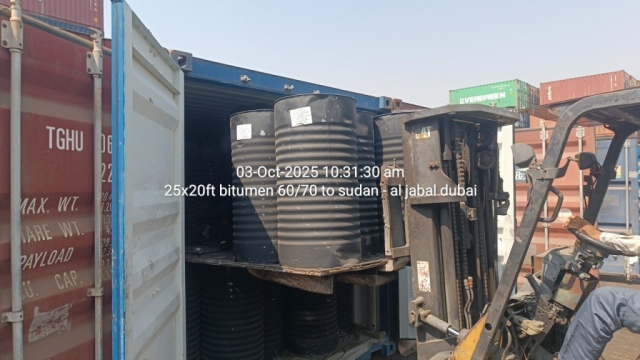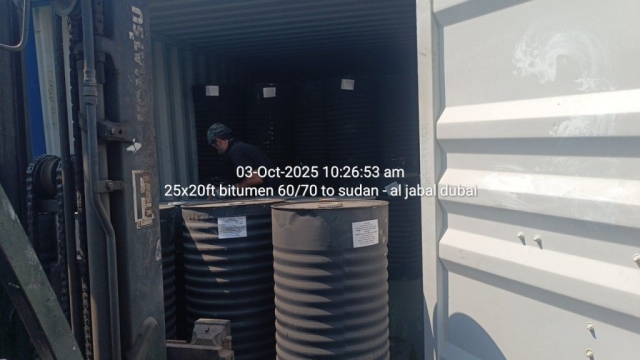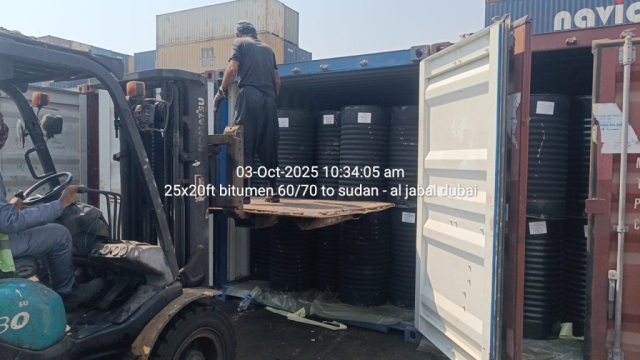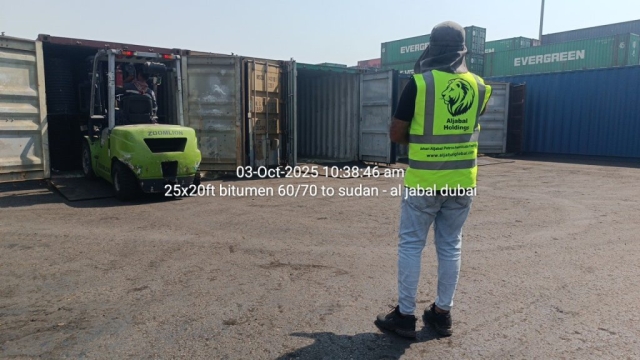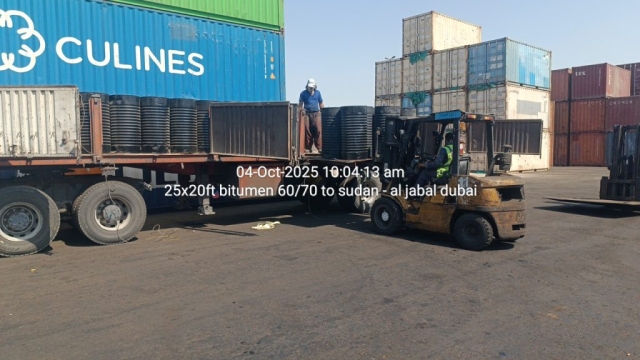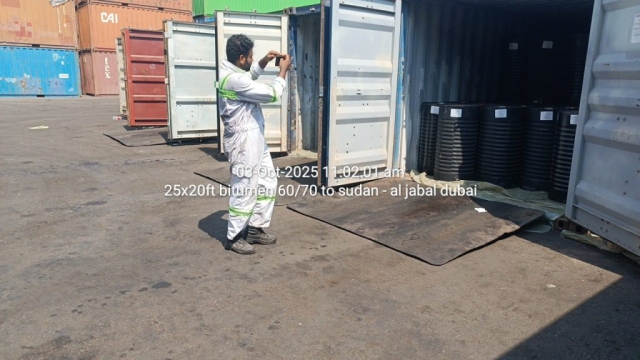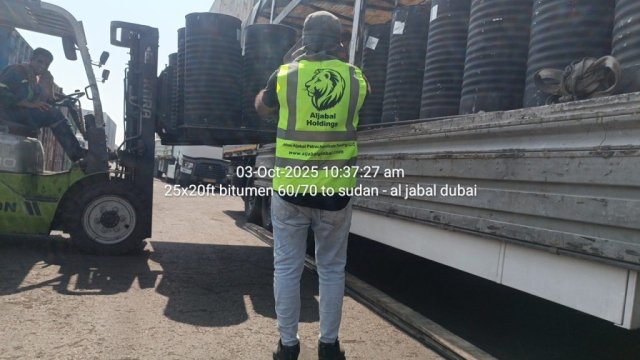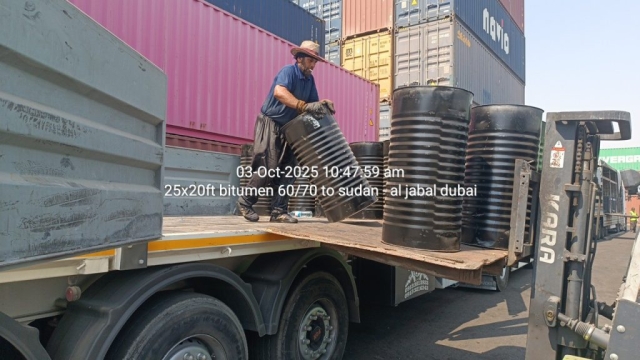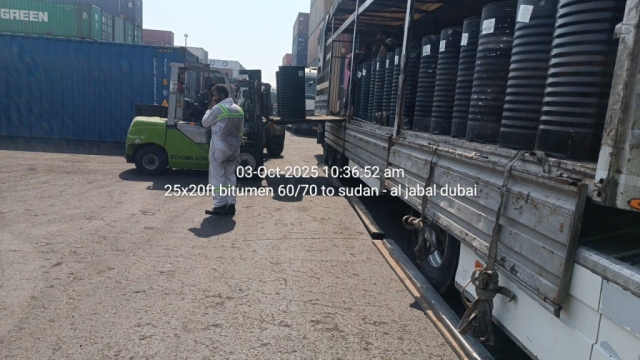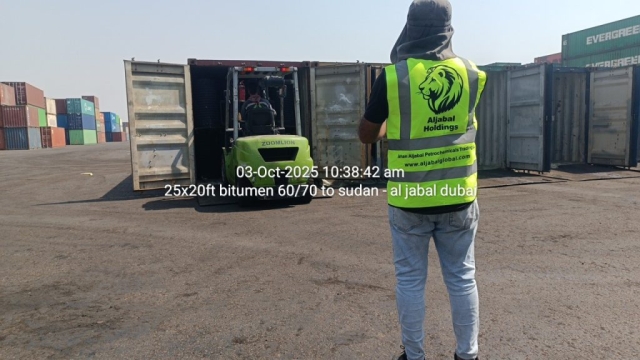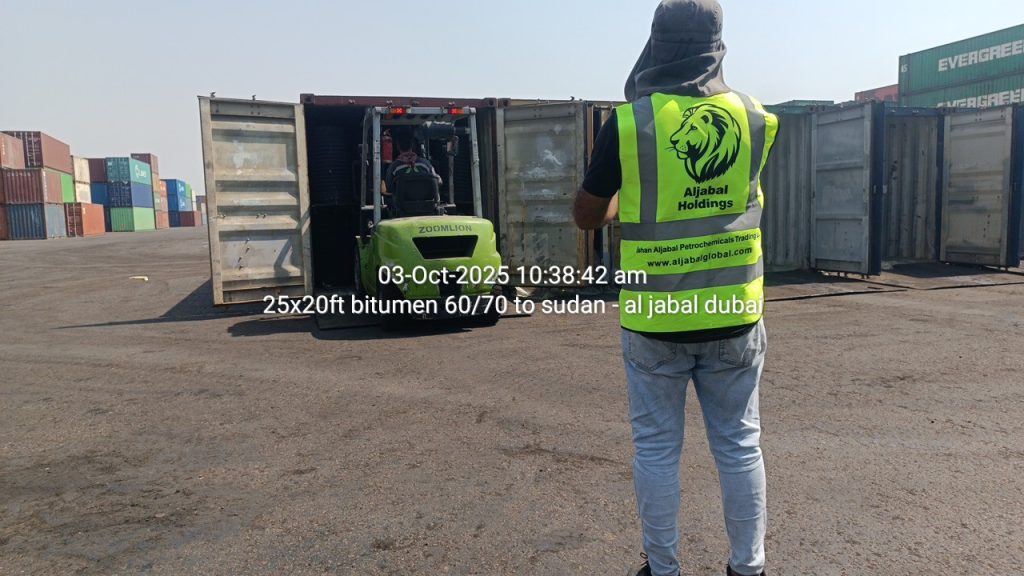
Introduction
When it comes to the construction and infrastructure industries, few materials are as vital as bitumen—especially the 60/70 penetration grade variety. In October 2025, Aljabal Holding, a name synonymous with reliability in petroleum product exports, made a significant mark by successfully exporting 25×20 ft containers of Bitumen 60/70 to Sudan. This is not just another shipment; it’s a key milestone in the ongoing development efforts across East Africa and a pivotal moment in the bitumen trade route connecting the Middle East to Africa.
This article unpacks every detail of this major export event. From the quality specifications and logistics involved to the strategic implications of this shipment for Sudan and beyond, we’ll walk you through the big picture. If you’re in the petroleum, logistics, or infrastructure development industries—or simply researching reliable bitumen suppliers—you’ll want to read through this detailed breakdown.
Who is Aljabal Holding?
Aljabal Holding has emerged as one of the most reputable names in the global export of petroleum products. Headquartered in the Middle East, Aljabal specializes in the supply and transportation of refined oil products including bitumen, base oils, lubricants, and solvents. With decades of experience, the company is recognized for its logistical expertise, product quality assurance, and ability to handle high-volume international orders.
What sets Aljabal apart is its seamless coordination between sourcing, refining, packing, and shipping. Its client base includes governments, private contractors, infrastructure development companies, and distributors across Asia, Africa, and Europe. Over the years, Aljabal Holding has established itself as a dependable supplier for African markets, consistently fulfilling large-scale demands with precision and compliance.
The company’s recent move to export 25 containers of Bitumen 60/70 to Sudan further highlights its commitment to supporting infrastructure development in regions that are witnessing rapid urbanization and road-building initiatives. It’s a bold step—one that speaks volumes about the company’s operational strength and market foresight.
Overview of Bitumen 60/70
Bitumen 60/70, also known as penetration grade bitumen, is one of the most commonly used materials in road construction. The numbers 60 and 70 refer to the penetration range, meaning the bitumen is semi-hard and suitable for moderate climates. It’s manufactured by distilling crude oil and has excellent adhesion, water resistance, and durability.
Let’s break down some key properties of Bitumen 60/70:
- Penetration Value: 60 to 70 (0.1 mm)
- Softening Point: Around 49–56°C
- Viscosity: High, which ensures long-lasting adhesion
- Application: Road surfacing, paving, and asphalt mixes
Why is Bitumen 60/70 preferred? It strikes a perfect balance between flexibility and stiffness—meaning it won’t crack under temperature changes and can handle the stress of traffic. This makes it a go-to material for developing countries like Sudan, where road quality plays a major role in economic growth.
Why Sudan Needs Bitumen?
Sudan, a nation undergoing major economic transition, is investing heavily in transportation infrastructure to improve internal connectivity and support trade routes across Africa and the Middle East. Roads, bridges, and airports are under construction or in the planning phase—and they all need one thing: high-quality bitumen.
Due to its limited refining capabilities, Sudan relies on imports for materials like bitumen. The country’s geographical vastness and desert terrain mean roads must be durable and weather-resistant. Bitumen 60/70 fits this requirement like a glove. It offers high stability for hot climates and ensures long-lasting surfaces, reducing the need for frequent repairs.
Recent infrastructure initiatives include:
- Khartoum ring road expansion
- Port Sudan logistics corridor
- Major highway connectivity projects to Chad and South Sudan
For all of these, bitumen is the unsung hero. And that’s why this shipment from Aljabal Holding is so timely and crucial.
Importance of Bitumen in Infrastructure Development
Let’s be real—when was the last time you thought about the stuff beneath your car tires? Probably never. But without bitumen, modern infrastructure would be impossible. Roads, highways, airport runways, and even waterproofing applications rely on this black gold. It’s the backbone of any nation’s development, especially in emerging economies.
In developing countries like Sudan, bitumen acts as a lifeline. It ensures smoother roads, which in turn reduces travel time, boosts trade, and connects rural areas with urban hubs. With better roads, businesses thrive, emergency services respond faster, and logistics become more efficient.
Bitumen 60/70, in particular, is ideal for Sudan’s tropical to semi-arid climate. Its viscosity and thermal properties make it resistant to rutting and cracking, which are common problems in poorly constructed roads. Aljabal’s shipment directly supports these goals by providing premium-grade, penetration-tested bitumen, designed for long-lasting infrastructure.
Furthermore, infrastructure spending has a multiplier effect. Every dollar invested in road construction results in higher GDP growth, job creation, and improved public safety. Bitumen isn’t just a product—it’s an enabler of national progress.
Aljabal Holding’s Strategic Role in African Bitumen Supply
Aljabal Holding isn’t new to the African continent. With trade routes already established in Nigeria, Ethiopia, Kenya, and Tanzania, the company is extending its reach into Sudan to meet the rising demand for construction-grade petroleum products.
But why Aljabal?
- Proven reliability – The company has a strong track record of timely delivery and quality.
- Logistical flexibility – Sea, rail, and road logistics are optimized for African terrains.
- Regulatory compliance – Aljabal adheres to international and local export laws and safety protocols.
- Technical expertise – With in-house engineers and QA professionals, they ensure every drop of bitumen meets specs.
Sudan is currently going through massive reconstruction and modernization, and Aljabal has strategically positioned itself as a primary supplier. This 25-container shipment isn’t a one-time deal—it’s part of a long-term export roadmap aiming to strengthen Africa’s infrastructure backbone.
Details of the October 2025 Shipment
This isn’t just any shipment. It’s a landmark logistics event. In October 2025, Aljabal Holding dispatched 25 containers, each measuring 20 feet, fully loaded with Bitumen 60/70, to Sudan. That’s approximately 500 metric tons of high-grade bitumen—enough to pave several kilometers of road.
Key shipment facts:
- Number of Containers: 25
- Container Size: 20 ft (standard)
- Bitumen Grade: 60/70
- Packing Type: New steel drums, each 180–200 kg capacity
- Total Quantity: Approx. 500 MT
- Departure Port: Jebel Ali Port, UAE
- Arrival Port: Port Sudan
- Estimated Transit Time: 14–18 days
The operation was fully supervised, with certified documentation including:
- Certificate of origin
- SGS inspection report
- MSDS and COA (Certificate of Analysis)
- Commercial invoice & packing list
Each container was sealed and tracked using GPS-enabled devices, ensuring real-time monitoring and full transparency from dispatch to delivery. This level of detail isn’t common in the bitumen industry and further cements Aljabal’s commitment to premium service and accountability.
What Does 25×20 Ft Containers Mean in Logistics?
If you’re not familiar with shipping logistics, you might be wondering, “What does 25×20 ft containers actually mean?” Let’s break it down.
Each 20-foot container (TEU) holds up to 28 metric tons of cargo, depending on the packaging type. For bitumen packed in new steel drums, each drum weighs approximately 200 kg and takes up about 0.2 m³ of space.
So here’s the math:
- Per container: ~20–22 metric tons (100–110 drums)
- Total for 25 containers: 500–550 metric tons
- Volume moved: Over 600 m³ of cargo
Now think of this from a logistics standpoint. Handling 25 containers means:
- Efficient loading and unloading
- Specialized cranes and forklifts
- Customs clearance in two countries
- Precise timing coordination
The coordination between shipping companies, port authorities, warehouse managers, and customs officials needs to be absolutely flawless. Aljabal’s experienced logistics team managed this seamlessly, further proving why they are a preferred export partner in the petroleum products sector.
Origin of the Bitumen Shipment
The bitumen used in this shipment was refined in the Middle East, sourced from ISO-certified oil refineries under long-term supply contracts. Aljabal ensures that every batch comes from a trusted and vetted refinery, meaning product quality is not just a promise—it’s a guarantee.
Key origin details:
- Refining Source: UAE-based refinery
- Batch Testing: Conducted before loading
- Packing: Done in-house at Aljabal’s ISO-compliant facility
- Temperature Control: Maintained during loading to prevent degradation
Unlike cheaper suppliers who often cut corners or deliver aged stock, Aljabal ensures that only freshly packed bitumen reaches the end user. This shipment was no exception. The fresh refinery date and COA were included in the shipping documents, leaving no room for ambiguity.
This attention to sourcing sets a higher standard in the industry and builds long-term trust with buyers and government clients.
Port of Departure and Port of Arrival
The shipment began its journey from Jebel Ali Port, one of the busiest and most efficient ports in the UAE. Known for its streamlined customs processing and high-capacity terminals, Jebel Ali handles millions of tons of cargo each year—making it the perfect launch point for international exports.
Here’s a quick look:
Departure Port: Jebel Ali Port, UAE
- Handling Time: 3–5 days
- Customs Clearance: Done electronically
- Storage Facilities: Temperature-controlled warehouses
- Shipping Line Used: MSC / Maersk (depending on schedule)
Arrival Port: Port Sudan
- Offloading Capacity: 20+ containers/day
- Customs Process: Governed by Sudanese import regulations
- Transit to Inland Destination: Trucked to Khartoum and other project sites
The journey was planned for zero bottlenecks. Customs documentation, health & safety certificates, and compliance paperwork were submitted in advance, ensuring swift processing on both ends. Aljabal even coordinated with port agents in Sudan to oversee unloading and inland logistics.
Transit and Delivery Timeline
Time is money, especially in construction projects. Delays can be costly, both financially and reputationally. That’s why Aljabal Holding put together a precise, time-bound delivery plan to ensure the bitumen reached its destination as scheduled.
Here’s the timeline overview:
- October 3, 2025 – Containers packed and sealed
- October 5, 2025 – Departed Jebel Ali Port
- October 15, 2025 – Arrived at Port Sudan
- October 17–19, 2025 – Customs clearance and container offloading
- October 20–24, 2025 – Inland transport to project sites
That’s a total door-to-site timeline of 3 weeks—incredible for a cross-border shipment of hazardous material. Thanks to real-time tracking, pre-planned documentation, and professional agents on both ends, the delivery was not just timely—it was flawless.
This efficiency is one of the many reasons contractors and government entities in Africa trust Aljabal as their bitumen supplier.
Quality Assurance and Specifications of Bitumen 60/70
When it comes to bitumen, not all products are created equal. The quality and consistency of Bitumen 60/70 are crucial to ensuring it performs well under heavy traffic, harsh weather, and long-term use. Aljabal Holding understands this better than most, which is why their shipments are subject to strict quality assurance protocols before and during export.
Let’s dive into the specifics of the product used in the October 2025 shipment to Sudan:
Technical Specifications of Bitumen 60/70:
| Property | Specification |
|---|---|
| Penetration at 25°C | 60–70 (0.1 mm) |
| Softening Point (°C) | 49–56°C |
| Ductility at 25°C | >100 cm |
| Specific Gravity at 25°C | Approx. 1.01 |
| Flash Point | Min 232°C |
| Solubility in Trichloroethylene | >99% |
| Loss on Heating | Max 0.2% |
| Spot Test | Negative |
Each drum of bitumen is clearly labeled with batch numbers, manufacture date, and grade. Before packaging, the product undergoes testing in a certified laboratory. The results are compiled into a Certificate of Analysis (COA) and MSDS (Material Safety Data Sheet)—both essential for regulatory compliance.
Aljabal even goes one step further by offering third-party inspection reports from SGS or Bureau Veritas, proving that what’s promised is exactly what’s delivered.
This level of transparency is rare in global trade and is one of the reasons buyers from Africa, Asia, and Europe continue to rely on Aljabal Holding for consistent, high-quality bitumen shipments.
Packaging and Container Handling Process
Bitumen is a sensitive product. Exposure to air, heat, or contamination can degrade its performance. That’s why packaging and container handling are just as important as the bitumen itself.
For this October 2025 shipment, Aljabal Holding followed international best practices for safe and efficient packaging:
Packaging Format:
- New Steel Drums, 180–200 kg each
- Inner lining to prevent corrosion
- Heat-resistant and leak-proof seals
- Drums placed on wooden pallets for easy handling
Container Loading:
- 110 drums per 20-ft container (approx. 22 MT)
- Drum stacking done with forklifts to avoid damage
- Drum arrangement optimized for space and stability
- Use of desiccants to prevent moisture build-up
Each container was fitted with shock-absorbent padding and air vents to maintain internal environment stability. Upon loading, containers were sealed with tamper-proof security locks and barcode-tagged for tracking.
Aljabal’s packaging protocols ensure that the bitumen arrives undamaged, uncontaminated, and ready for use, whether it’s going directly to a road-paving site or stored for future use.
Sudan’s Ongoing Construction Projects and Bitumen Demand
Sudan has been ramping up its investment in public infrastructure, especially after lifting several international sanctions and entering new economic partnerships. The demand for bitumen—particularly penetration grade 60/70—is surging due to multiple high-priority projects underway in 2025.
Here are some major initiatives driving the demand:
- Khartoum–Port Sudan Highway Expansion
- Darfur Inter-Regional Road Connectivity Plan
- Sudan–Ethiopia Border Trade Route
- Urban Development Zones in Khartoum and Omdurman
These projects are being financed by both government funds and international development agencies, requiring suppliers to meet global standards in material supply.
The 25×20 ft containers shipped by Aljabal Holding are part of the initial phase of multiple contracts aimed at supplying thousands of tons of bitumen in the coming months. Aljabal’s role is pivotal, ensuring that road-building doesn’t stop due to material shortages or substandard products.
The demand is expected to continue rising as Sudan pushes toward becoming a logistical hub for East Africa—and quality bitumen will be central to making that vision a reality.
Environmental & Safety Compliance for Bitumen Shipping
Transporting bitumen isn’t like shipping furniture or clothing—it’s a hazardous material, and every stage of the process must comply with strict safety and environmental regulations.
Aljabal Holding takes a zero-compromise approach to this. All containers in the October 2025 shipment complied with the following standards:
- IMDG (International Maritime Dangerous Goods) Code
- ISO 9001:2015 Quality Management Systems
- UN Certification for Packaging
- Occupational Safety Procedures for handling, loading, and offloading
- Eco-friendly desiccants and low-carbon transport vessels
Shipping bitumen across the Red Sea to Port Sudan also means navigating through marine environmental zones, where strict rules are in place to prevent oil-based contamination. Aljabal Holding worked with licensed shippers who follow IMO (International Maritime Organization) guidelines.
Furthermore, the drums were made of 100% recyclable steel and labeled for post-use collection. This eco-conscious approach is a refreshing contrast to many players in the bitumen trade who still use old or substandard drums.
With this level of responsibility, it’s no surprise that Aljabal’s reputation continues to grow among global importers and environmental regulators alike.
Challenges in Exporting Bitumen to Sudan
Exporting to Sudan isn’t without its hurdles. From political instability to complex customs procedures and infrastructure bottlenecks, the process requires grit, planning, and reliable partnerships.
Here are some key challenges Aljabal Holding had to navigate:
- Unpredictable Customs Delays
Sudan’s import clearance can often involve multiple agencies, manual processes, and sudden regulation changes. - Transport Infrastructure
Limited port handling capacity and aging road networks slow down inland delivery. - Local Currency and Banking Barriers
With restrictions on foreign currency transfers and sanctions-related banking policies, financial transactions require workarounds. - Weather & Climate
High daytime temperatures can impact bitumen’s consistency. Specialized containers and timely transit were essential to preserve quality.
Despite these hurdles, Aljabal successfully delivered all 25 containers on time and in perfect condition, proving their unmatched operational capabilities and deep understanding of regional logistics.
Customs and Regulatory Framework in Sudan
When exporting to Sudan, especially petroleum-based products like bitumen, customs clearance and regulatory compliance are among the most critical phases of the operation. Sudan has a multilayered regulatory system that includes import approvals, technical inspections, and documentation verification by multiple government bodies.
Aljabal Holding’s October 2025 shipment had to navigate:
- Sudanese Customs Authority (SCA)
- Ministry of Infrastructure & Transportation
- National Standardization and Metrology Corporation
- Port Sudan’s Harbor Authorities
Each entity requires specific documents, such as:
- Commercial Invoice
- Certificate of Origin
- Packing List
- Material Safety Data Sheet (MSDS)
- Certificate of Analysis (COA)
- Bill of Lading
- Product Inspection Reports
What makes Aljabal stand out is their pre-clearance preparation. Before the vessel even left Jebel Ali Port, all required documents were digitized and pre-submitted to Sudanese authorities via their local legal and trade agents. This proactive approach reduced delays, allowed for early product inspection scheduling, and ensured zero demurrage charges at Port Sudan.
This shipment serves as a case study in regulatory navigation, showing that with proper preparation and on-ground partnerships, even complex customs environments can be managed efficiently.
The Role of Aljabal’s Supply Chain Team
Behind the scenes of any successful international shipment is a dedicated, experienced supply chain team. Aljabal Holding has a specialized logistics and trade compliance department that oversees every step—from sourcing to delivery.
In the October 2025 bitumen export, the supply chain team was responsible for:
- Supplier Coordination: Confirming refinery readiness and batch QA.
- Packing and Logistics: Managing loading, safety checks, and documentation.
- Freight Booking: Selecting shipping lines with fastest transit and reliable service.
- Customs Documentation: Handling bilateral compliance for UAE and Sudan.
- On-Ground Support in Sudan: Partnering with customs agents, port handlers, and trucking fleets.
- Real-Time Tracking: Monitoring each container via GPS and providing daily updates to clients.
Their ability to handle such a large-scale shipment—25 containers—without incident showcases the operational discipline and strategic foresight that defines Aljabal Holding. It’s more than moving cargo; it’s managing a complex global supply chain in one of the toughest product categories on the planet.
Impact on Sudanese Local Market
This shipment didn’t just mark another business transaction—it had a direct impact on Sudan’s local market, especially the construction and infrastructure sectors.
Here’s how:
- Reduced Dependency on Unreliable Suppliers
Prior to Aljabal’s involvement, Sudan relied on fragmented imports, often facing delays, inconsistent quality, and inflated prices. - Stable Pricing for Contractors
With a bulk supply secured, local contractors could plan large-scale projects without worrying about material shortages or price spikes. - Job Creation and Economic Multiplier
The timely availability of bitumen enabled dozens of road construction projects to proceed, creating thousands of labor opportunities in rural and urban areas. - Improved Road Conditions
Longer-lasting roads reduce vehicle damage and lower transport costs—benefiting everyone from farmers to logistics companies. - Confidence Among Foreign Investors
A consistent supply of high-quality construction materials sends a strong signal that Sudan is open for business and capable of sustaining infrastructure growth.
This shipment was more than a delivery—it was a catalyst. A small but significant step toward stabilizing Sudan’s infrastructure supply chain and fueling its economic revival.
Feedback from Sudanese Distributors
The feedback from Sudanese importers and distributors was overwhelmingly positive. Many industry players have dealt with unreliable suppliers, who often deliver low-grade or mislabeled bitumen. That’s why Aljabal Holding’s transparency and professionalism stood out immediately.
Here are some of the highlights from local partners:
“The drums were in excellent condition, clearly labeled, and delivered right on schedule.” – Infrastructure Supplier, Khartoum
“This is the first time we’ve received a full shipment with complete documentation, including SGS testing reports.” – Logistics Coordinator, Port Sudan
“With this shipment, we’ve been able to finish paving our section of the national highway ahead of schedule.” – Civil Engineer, Red Sea State
Such feedback not only validates Aljabal’s operational model but also sets the tone for future collaborations and long-term supply contracts.
Global Demand Trends for Bitumen 60/70
Globally, demand for Bitumen 60/70 is surging—especially in developing regions where governments are prioritizing infrastructure growth. According to recent trade reports:
- Africa’s bitumen demand is expected to grow by 6–8% annually until 2030.
- Asia and the Middle East are pushing for smart cities and road modernization, increasing demand for penetration grade bitumen.
- Global bitumen trade value is projected to exceed $90 billion by 2030.
This makes the October 2025 shipment from Aljabal Holding a reflection of a much larger market shift. Exporters who can provide quality assurance, reliability, and timely delivery are set to dominate.
For Sudan, securing bitumen from a supplier like Aljabal is not just an import—it’s a strategic move to align with global quality standards while keeping up with regional infrastructure trends.
Aljabal’s Future Export Plans for Africa
Encouraged by the success of the October shipment, Aljabal Holding is now looking at expanding its presence across Africa, with Sudan becoming a key transit and distribution hub.
Planned initiatives include:
- Establishing a Bitumen Storage Terminal near Port Sudan.
- Partnering with Local Contractors for road-building tenders.
- Launching a Regional Logistics Office in Khartoum to facilitate future shipments.
- Introducing New Products like bitumen emulsion, cutback bitumen, and polymer-modified bitumen (PMB).
The company is also exploring rail-based inland transport to reduce delivery time and carbon emissions. With its vast industry experience and robust infrastructure, Aljabal aims to become Africa’s preferred bitumen exporter by 2027.
Competitive Edge: Why Choose Aljabal Holding?
There are hundreds of suppliers in the bitumen industry, so what gives Aljabal Holding the upper hand?
Let’s break it down:
- ✅ Quality Assurance: ISO-certified products with third-party testing.
- ✅ Timely Delivery: Coordinated logistics ensure zero-delay shipping.
- ✅ Transparent Documentation: Full set of regulatory and safety papers provided.
- ✅ Local Partnerships: Strong networks in Sudan and across Africa.
- ✅ Technical Support: Dedicated engineers and consultants to support client needs.
While other suppliers might offer lower prices, they often compromise on quality or delay shipments. Aljabal Holding prioritizes long-term relationships and value over volume, which in turn leads to client loyalty and repeat contracts.
What This Shipment Means for the Bitumen Market
In the grand scheme of global trade, 25 containers might seem like a drop in the ocean. But in Sudan, this shipment marks a turning point. It represents:
- A shift toward premium-grade bitumen imports
- A case study in efficient cross-border logistics
- A demonstration of how the private sector can support national development
It’s not just about bitumen—it’s about building the roads to Sudan’s future. And Aljabal Holding is right there at the front of the convoy, leading the charge.
Conclusion
The successful export of 25×20 ft containers of Bitumen 60/70 to Sudan by Aljabal Holding in October 2025 is a milestone worth celebrating. It exemplifies operational excellence, quality assurance, and international collaboration in a sector that rarely gets the spotlight it deserves.
From refinery to road, Aljabal Holding has proven its capacity to deliver—literally and figuratively. With this shipment, not only has Sudan taken a significant step toward its infrastructure goals, but Aljabal has also reaffirmed its place as a leading force in global bitumen supply.
Whether you’re a contractor, government official, or logistics expert, one thing is clear: Aljabal Holding is paving the way—one drum at a time.
FAQs
1. What is Bitumen 60/70 and why is it used in Sudan?
Bitumen 60/70 is a penetration grade bitumen used mainly for road construction. Sudan uses it due to its ability to withstand hot climates and heavy traffic loads.
2. How much bitumen was shipped by Aljabal Holding to Sudan in October 2025?
25 containers, each 20 ft, were shipped—totaling approximately 500 metric tons of Bitumen 60/70.
3. What ports were involved in the shipment?
The shipment departed from Jebel Ali Port (UAE) and arrived at Port Sudan.
4. Was the shipment quality-verified?
Yes, each batch was tested and came with a Certificate of Analysis, MSDS, and third-party inspection reports.
5. Will Aljabal Holding continue supplying bitumen to Sudan?
Yes, the company plans to expand its operations in Sudan and other African nations with more frequent and larger shipments.

